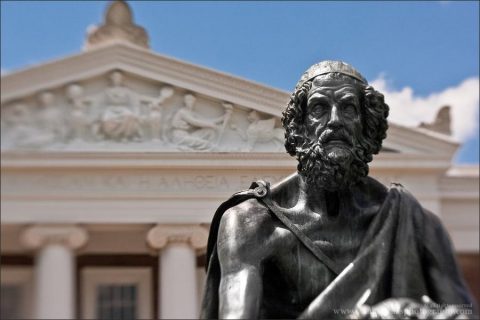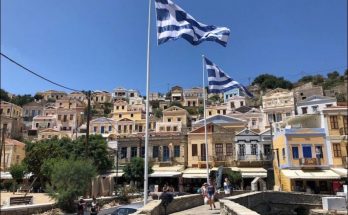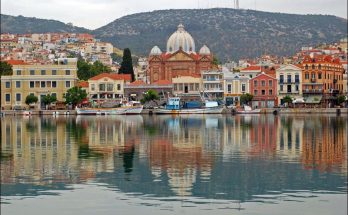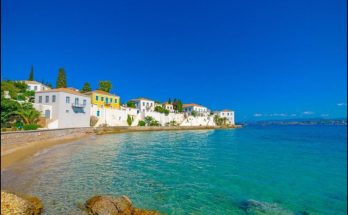The name ‘Homer’ is still used as a convenient term for the author or authors of the two great epics, the Iliad and the Odyssey. But nothing whatever is known concerning these early poets: instead of biography, we find the ‘Homeric Question’–that is, the problem of the time and place at which the two poems were made, and the manner in which they assumed their present shape.
Only two definite facts may be regarded as certain. First, ‘Homer’ was by law recited in Athens at the Panathenaic festival. This law may have been the work of the despot Pisistratus, who died in 527. Second, for generations before that time the poems had been well known throughout Greece, selected portions or episodes being sung in public by ‘rhapsodes’.
Did one poet compose the two epics? If so, when? Did one write the Iliad, another the Odyssey? Or is each built up by a master out of separate pre-existing lays? Or was there a large nucleus of each, to which smaller portions were later attached? Which are the later portions? Why, when, and where did they come into being? In what dialect or dialects of Greek were these various works composed?
So many theories have been put forward that it would be difficult to offer even a vague account which would command general assent. Perhaps there would be least objection to the following statement. An Iliad, telling of Achilles’ wrath and its appeasement, was composed something like one thousand years before Christ; its bulk was afterwards increased by episodes not vitally connected with the original theme. Later, an Odyssey, or tale of Odysseus’ return home from Troy, came into existence and was enlarged by other narratives, especially the journey of his son Telemachus in search of him. At Athens the two poems were given a fixed form, and the language was in some degree Atticized.
That these epics, however each grew, are growths of two different epochs, seems certain. This view was known even in ancient times: in the Alexandrian Age it was held by scholars called the Separatists (chorizontes). Some differences are fundamental. Throughout the Iliad (save for the actual reminiscences of Nestor and other old men) we move in a glorious present.
The Odyssey is pervaded by a reflective air–we seem to have got past things: the Tale of Troy is now history. It is no real answer that as the subject has changed the manner must be different. For not only do we find gardens instead of battles, sea and islands instead of camps and Trojan streets; when we do meet bloodshed in the Odyssey the tone has altogether changed.
The Slaying of the Suitors is an execution performed by a sorely-tried householder, whereas the feats of Achilles or Diomedes before Troy are full of ‘the bloom and the beauty, the splendour of spears’. The gods, too, are different. In the Iliad, many of them come to earth frequently as belligerents or counsellors; their home is the known mountain Olympus. Throughout the Odyssey, Olympus is no mountain but some more remote region, and the intervention of gods is practically confined to the enmity of Poseidon against Odysseus and Athena’s encouragement of that hero and his son.
Magic, almost unknown in the earlier epic, is a marked element in the later: the marvellous herbs, lotus, moly, the drugs and wand of Circe, the nepenthe administered by Helen to Telemachus, the miraculous Phaeacian vessel, the invisibility or transformation of Odysseus. Nor can we mistake the changed attitude towards common folk. The Iliad makes of them an anonymous background: Thersites and Dolon are the only names. But Eumaeus the swineherd is important in the latter half of the Odyssey; Irus the braggart beggar provides a striking episode; the men of Odysseus’ crew are important to his fortunes through their loyalty, fears, folly, and claim upon his care. Finally, the Iliad is pervaded by a sense of the mightiness of passion, the Odyssey by a sense of moral values. The treachery of Pandarus is actually instigated by gods, but the Suitors have no deity on their side.
Each epic contains twenty-four books; the Iliad has 15,693 lines, the Odyssey, 12,110. Both poems are concerned with the Tale of Troy. Paris, son of Priam, the Trojan king, having taken Helen from Sparta, her husband Menelaus and his brother Agamemnon gathered a great host from the whole of Greece and sailed to bring her back and punish Troy. They besieged the city for ten years, and, after Achilles, the greatest of the Greeks, and Hector, the champion of Troy, had fallen, they succeeded by means of the Wooden Horse which, filled with warriors, was by a trick sent inside the walls.
The Iliad relates the Wrath of Achilles and is confined to certain events in the tenth year of the siege–how Achilles quarrelled with Agamemnon and refused to fight, how the Greeks were therefore beaten by the Trojans till Achilles in grief for the death of his friend Patroclus took the field again, and how he slew Hector. The Odyssey tells the adventures of Odysseus (Ulysses) after the sack of Troy: his ten years’ wandering on his way home to Ithaca, and the events on that island, culminating in the destruction of the princes who wooed his wife Penelope and wasted his goods.
Another means to variety is the use of similes. Most poets have employed such figures to enforce and irradiate the act or scene to which they refer., In the Iliad they carry us away from it, refreshing the mind by a momentary distraction, and seldom corresponding in details to the original fact. Paris rushing through Troy to battle is compared to a stalled horse full-fed at the ‘manger, which breaks its chain and with head high, mane flowing, gallops over the plain to the feeding-ground of the mares.
There is but one similarity–eager confident speed; and the examples of this type are almost innumerable. The similes of the Iliad show, in fact, highly sophisticated art: the poet has undertaken to sing of battles, but ingeniously refreshes his hearer by sudden glimpses of other life and activity. So in Flemish sacred pictures an artist duly portrays the Virgin and her Child, but sets in the background a little gleaming window through which, if we draw near, we may espy the gables of Bruges or Haarlem, and microscopic Dutchwomen on the way to market.
In the Odyssey, exciting passages are less common, the general tone being a quiet portrayal of life and less heroic people; the violence is mostly the violence of Nature or of non-human creatures. Penelope’s suitors behave ill, but their standard of violence is childish after those hurricanes of the Iliad. The first notable episode is the story (iv. 351-570) told at leisurely length by Menelaus to his visitors Telemachus and young Pisistratus, how he consulted Proteus of Egypt, ‘the unerring old man of the sea’ who shepherded seals instead of sheep and changed himself into various elusive shapes.
In Book v we read of Odysseus’ parting with Calypso–a romantic picture of the island far from the haunts of men and gods, its poplars and pines towering to Heaven, and the Wanderer felling them to make his boat, with no creature for his companion save the mysterious Nymph; then come his embarkation and voyage, his shipwreck far from land, his escape by favour of the sea-spirit Ino, who gives him her veil as support while he swims for two days and nights; lastly the vivid account of his attempt to land on the rocky shore, till he finds a welcoming river-mouth.
While Odysseus sleeps in utter weariness beneath the bushes, naked save for his coverlet of fallen leaves, the princess Nausicaa, daughter of the Phaeacian king, comes down to the shore with her maidens in order to wash clothes. Work over, the girls are playing at ball, and an excited scream from one of them awakens Odysseus, who comes forward to ask aid, screening himself with a leafy branch. The other girls run away in fright, but Nausicaa stands her ground and with perfect self-possession and breeding converses with the naked suppliant.
Later she leads him into the city and instructs him how to gain the protection of her royal parents. We hardly hear again of this perfect figure of maidenly discretion and dignity; for once we bear a grudge against an immortal poet. He is clearly using a simple and delightful story, how an utterly indigent but glorious Stranger from the sea met and married the daughter of a wealthy king; but the plan of the whole epic forbids such an end–the little story melts away into nothing.
Finally, though Homer’s influence upon later literature would form a gigantic theme, one may yet briefly note how many types of later work are here to be found in embryo. The dirges uttered by Andromache, Hecuba, and Helen over Hector’s body ( Iliad, xxiv. 723-76) mark the beginning of lyric poetry. Drama, again, is to be found, not only in the loose sense of the word–in that sense, of course, it is common–but in its precise meaning. And the later the passage is in probable date, the more marked is this sense of drama.
In the second half of the Odyssey recognitions are delayed for no other purpose than to increase the tension: Odysseus lies to his father in order that Laertes’ normal yearning may change to downright heartbreak and so give greater effect to Odysseus’ revelation of himself. Even the Alexandrian idyll is anticipated in that awful moment when Hector communes with himself while awaiting Achilles ( Iliad, xxii. 126 sqq.): ‘…not now may I hold murmured converse with him from an oak or a rock, as maid and swain are used–maid and swain in murmured converse one with the other.’
And the picaresque novel springs from Homer: the Satyricon of Petronius was in its plot a parody of the Odyssey. Comedy, according to Aristotle, was descended from the Homeric Margites, and even in the Odyssey itself, some scenes of Penelope’s wooers have been regarded as foreshadowing the New Comedy of Menander and his fellows. It has been said often, and justly, that Homeric poetry was the Bible of the Greeks. It was also the training-ground of every literary artist, every man of taste and education, throughout the Greek world.
Visits: 288



